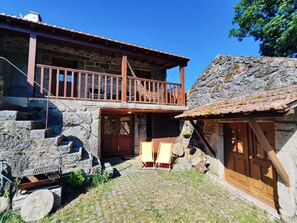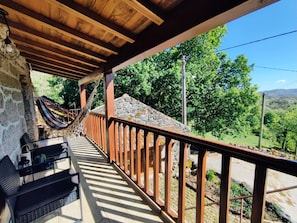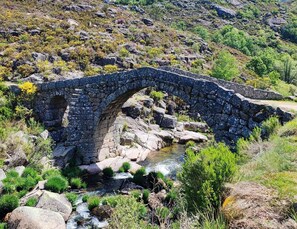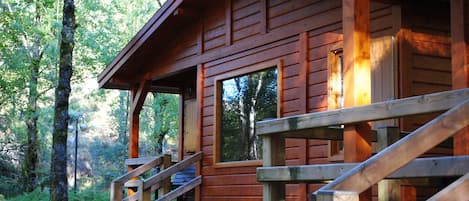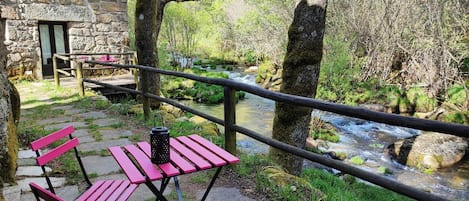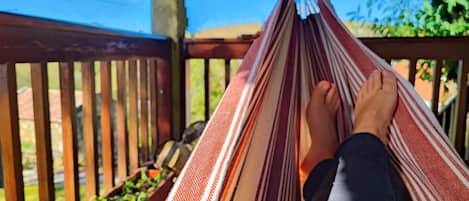Casa Boletus is a two bedroom house, with two bedrooms with double bed, a sofa bed and two extra single beds can be placed in each room.
It also has an outdoor area with a portable barbecue, SmarTv and Wi-Fi. Bed linen and towels are provided.
The kitchen is fully equipped. In the bathroom you will find a change of towels, hair dryer and amenities and the covered porch overlooking the Rio Laboreiro Valley is the perfect place to relax.
Here, you can opt for a siesta in the hammock or an aperitif sitting in the outdoor armchairs. Casa Boletus is the ideal place to relax and venture out into nature. The minimum stay is 2 to 7 nights, depending on the season.
Get to know this picturesque place...
Casa Boletus is located in Bago de Baixo, one of the most scenic areas of Castro Laboreiro, currently uninhabited.
The 'brandas' and 'inverneiras' are part of an ancient transhumance system. The Inverneiras are the places chosen by the Castrejo communities to spend the winter and are located in the valley at altitudes between 700 and 900 metres. The Brandas are the villages where traditionally the Castrejo communities spend the summer and are located on the plateau, above 1000 meters of altitude. Bago de Baixo is a wintering place located in the Rio Laboreiro valley, protected from the cold. Casa Boletus has southern exposure, which allows for several hours of sunlight with a breathtaking view over the Rio Laboreiro valley. The Rio Laboreiro is 200 metres from Casa Boletus, which allows for a short walk and a dip in the crystal clear natural waters. 1km from the trail (10 minutes by car) there is a large lake known locally as 'Poço do Contador' and a few metres further up the Cascata de Pontes, which offers an idyllic place for bathing and diving. In Bago de Baixo and its proximity pass footpaths approved by the Portuguese Federation of Camping and Mountaineering, classified as short routes (PR), for example the Castrejo trail (17 km), or the Grande Rota (GR) which crosses the entire National Park of Peneda Gerês (PNPG) from Castro Laboreiro, through Soajo, Vila do Gerês to Montalegre. The restoration of Casa Boletus took advantage of the original features and its architectural project combined tradition with comfort.
By buying and restoring the house, the owners fulfilled a dream and fulfilled a long-standing passion for Castro Laboreiro which has been strengthened over decades through the collection and identification of wild mushrooms and the undertaking of numerous mycological walks in the region. Castro Laboreiro has an exceptional mushroom diversity including numerous Boletus species, one of the most emblematic being Boletus edulis which, due to its fleshy body, is known in the region as 'fat ass'. These mycorrhizal fungi play a very important role in the forest ecosystem because the roots of the fungi and those of the trees establish symbiotic relationships in which both benefit. The mycelium of the fungus extends for kilometres allowing the tree to capture more nutrients and, in exchange, the tree, especially the oaks, provide the fungus with food.
The name Casa Boletus is a tribute to Mother Nature!


